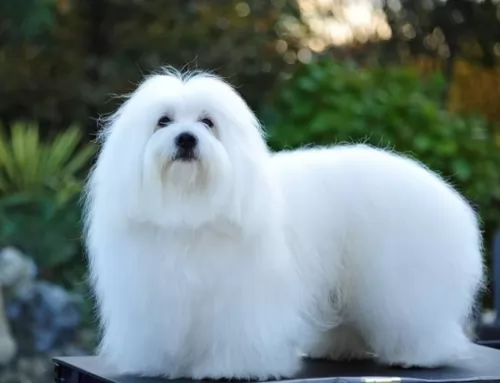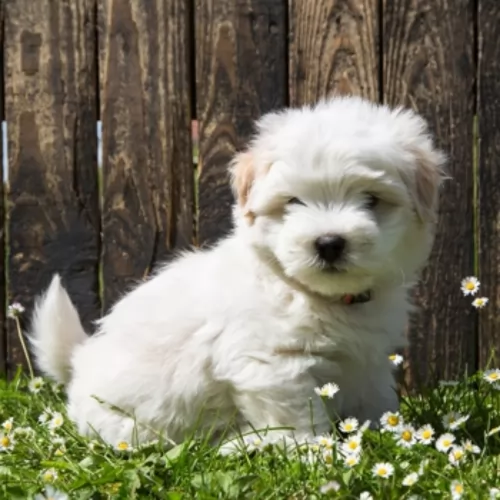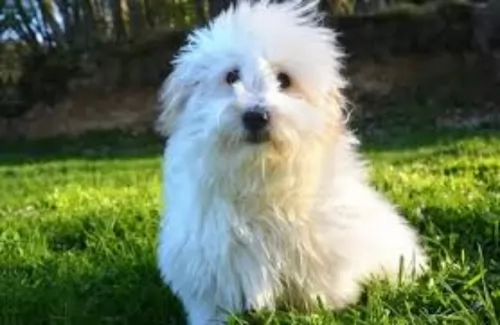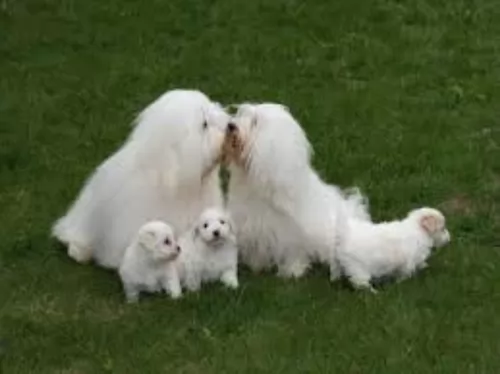 Petzlover
PetzloverCoton De Tulear is originated from Madagascar but Kuri is originated from French Polynesia. Coton De Tulear may grow 16 cm / 6 inches shorter than Kuri. Coton De Tulear may weigh 9 kg / 19 pounds lesser than Kuri. Both Coton De Tulear and Kuri has almost same life span. Both Coton De Tulear and Kuri has almost same litter size. Both Coton De Tulear and Kuri requires Low Maintenance.
 These cute little Coton de Tulear dogs originate from Madagascar and have in fact been named the ‘official dog of Madagascar’.
These cute little Coton de Tulear dogs originate from Madagascar and have in fact been named the ‘official dog of Madagascar’.
The Coton de Tulear actually takes his name from the seaport city of Tulear. In the 1970s a Frenchman brought a puppy to France, with the idea of establishing them as a breed. It was also at this time that the dogs were brought to North America.
This small fluffy white dog was also found on the island of Malta, becoming known as the Maltese. They were mated with other dogs such as the Barbet, a curly haired dog and other coat colors exist such as apricot, black and white and fawn. Other breedings led to the Barbichon family of dogs which includes the Bichon Bolognese and the Bichon Teneriffe. The modern day breeds are the Maltese and the Coton de Tulear.
As with many dog breeds, there are different tales about the origin of the dogs and one version is that the white cotton-ball type of dog survived a shipwreck off the Madagascar coast.
Kurī, also known as Guri or Peroor New Zealand Native Dog, is the Maori name for this dog which was introduced to New Zealand by the Maoris when they migrated from East Polynesia around 1280 AD.
They were in fact Polynesian dogs which died out in New Zealand. The Māoris would use the dog as a food source and the skins would be used to make some form of clothing. The bones were used to make items such as necklaces and fish hooks.
Not surprising then that the dog became extinct in New Zealand, with the last known Kuri specimens being found in the Museum of New Zealand Te Papa Tongarewa.
 These little dogs make perfect companions. They stand about 25–30cm with the female sometimes being slightly smaller. They weigh anything between 3 – 6kg. They’re robust little canines and can live up to 19 years or so when looked after well.
These little dogs make perfect companions. They stand about 25–30cm with the female sometimes being slightly smaller. They weigh anything between 3 – 6kg. They’re robust little canines and can live up to 19 years or so when looked after well.
The Coton de Tulear is easily recognized because of his soft, fluffy coat. Many people take their dogs to the dog salon to have him washed and his hair trimmed. His legs are short and straight as well as being muscled under the hair. The ears are floppy and the tail of the Coton de Tulear is carried straight or slightly curved.
The Coton de Tulear is a friendly, affectionate dog who has a gentle, cuddly side to him. They are social dogs and get on well with their human family and with the children in the home, loving the games they provide.
He will also get on well with other pets in the home and becomes amicable, relaxed and obedient with socialization and training. Small though he is, he makes a great watchdog too and is full of tricks, making him an entertaining pet to have around.
The Kuri is extinct now but it was a small to medium sized dog with a thick set neck. He stood between 25 and 46cm and weighed about 13 to 15 kilograms.
He had thick medium-length rough textured hair, small head, erect ears, short legs and a bushy tail. The color of their weatherproof coats varied and some were black, some white or cream and some were a mix of colors and patterns.
An interesting feature about them is that they didn’t bark but instead they howled. They were good at hunting birds.
The Kuri wasn’t considered the brightest breed, but he would have benefited from some training and socialization as this just makes a dog a better pet in every sense – more obedient and better behaved in all situations.
Some Kuris were friendly and able to bond with their human owners, while others were independent and somewhat aloof. Their size would have allowed them to be kept in the city or the country as they weren’t particularly energetic dogs, not requiring much ground to run around in.
 The Coton de Tulear just wants to please his human family and spend unforgettable moments with them, hating to be separated from them. He is such an adaptable little dog and will fit well into city- as well as country life.
The Coton de Tulear just wants to please his human family and spend unforgettable moments with them, hating to be separated from them. He is such an adaptable little dog and will fit well into city- as well as country life.
He is smart, comical, playful, independent and fun to have around as he is known for his clownish personality. Treat him well and he’ll repay you with plenty of love and loyalty.
It appears as though some Kuris were kept as pets and that they were able to develop loving relationships with their owners.
We don’t know too much about the extinct Kuri, but scientists are now studying and analyzing the hairs of the dog to find out more about it, and specifically why the Maori dog disappeared some time in the 19th century without a trace.
They will also be analyzing Kuri bones salvaged by archaeologists and which were found on rubbish heaps. These bones can be tested to see whether the diet of the Kuri changed much between the days of Maori settlements and the arrival of the European settlers.
 With proper care, your Coton can reach a ripe old age of 15 – 20 years of age. However, even this robust little dog will need to be watched, as he can fell prey to some common dog ailments -
With proper care, your Coton can reach a ripe old age of 15 – 20 years of age. However, even this robust little dog will need to be watched, as he can fell prey to some common dog ailments -
Bad Breath with your pet can be a sign of dental decay. Dental plaque for instance, caused by bacteria, can give your pet a terrible breath. It is important to brush your pet’s teeth 2 or 3x a week. Your vet can provide tips on how to brush your pet’s teeth with a special canine toothbrush and toothpaste.
Other things to look out for are hip dysplasia and chronic allergies. Allergies can cause itchy and dry skin as well as ear infections because of so much hair being in the ear canal. Speak to your vet about how to clean your pet's ears to avoid ear infection.
Some Kuri dogs scavenged while others were pets and ate well. The lifestyle they led would have determined their health. In those days they would have suffered with dental disease, common in adult dogs. Left untreated, dental disease can lead to dental tartar buildup with gum inflammation and tooth loss.
Dental disease can also lead to other organ diseases. These days brushing your dog’s teeth with canine toothpaste and toothbrush can help to ward off dental disease.
Those Kuris that weren’t pets, tried to survive scavenging, and their homeless situation could well have led to ear infections – caused from a wax- and dirt buildup within the ear. He would have been frantic trying to scratch his ears. In modern times, if your dog showed signs of an ear infection, you would need to get him to the vet.
 Coton de Tulears will need some exercise if you want him to remain lean and fit. It is important to provide exercise and games for your dog to prevent boredom. Activity levels for any dog, including the Coton, will depend on his age and health.
Coton de Tulears will need some exercise if you want him to remain lean and fit. It is important to provide exercise and games for your dog to prevent boredom. Activity levels for any dog, including the Coton, will depend on his age and health.
A walk every day and some ball games will keep your pet happy and prevent him from resorting to destructive behavior from sheer boredom and frustration.
The long coat will require some careful grooming and you will need to be on the lookout for excess hair around the paws and in the ears.
He is not a great shedder and brushing twice a week will remove loose hairs and provides the perfect opportunity to check for fleas and ticks.
Just like any other dog, your Coton de Tulear will need a warm, dry place to sleep. If you haven’t already invested in a doggy basket or dog bed, you can use a cardboard box for now, before making up your mind what you want for your pet.
A well behaved, obedient dog is a pleasure for everyone, and training and socialization is important, even for a small dog. Your dog will understand simple commands such as ‘sit’, ‘down’ and ‘come’ and also know how to walk well on a leash.
The Kuri will have required regular grooming which means a brushing down twice a week. Brushing would have been useful to prevent loose hairs from shedding with the dog. He would have had to have his ears and eyes checked too to avoid infections. Brushing him would have given his owner the chance to check him over for fleas and ticks too.
As the Kuri wasn’t an overly energetic dog, a walk a day would have kept him content and fit.
The Kuri was a dog that essentially formed part of someone else’s diet. Those that managed to escape being a meal for someone no doubt had to scavenge for food. Because they were used to help people catch birds, they themselves were used to catching birds for themselves.
As a small to medium sized dog, if you were to keep such a dog as a pet you would have given him a cup or two of dried kibble a day and tried to vary his diet by including some home-cooked food and raw meat.